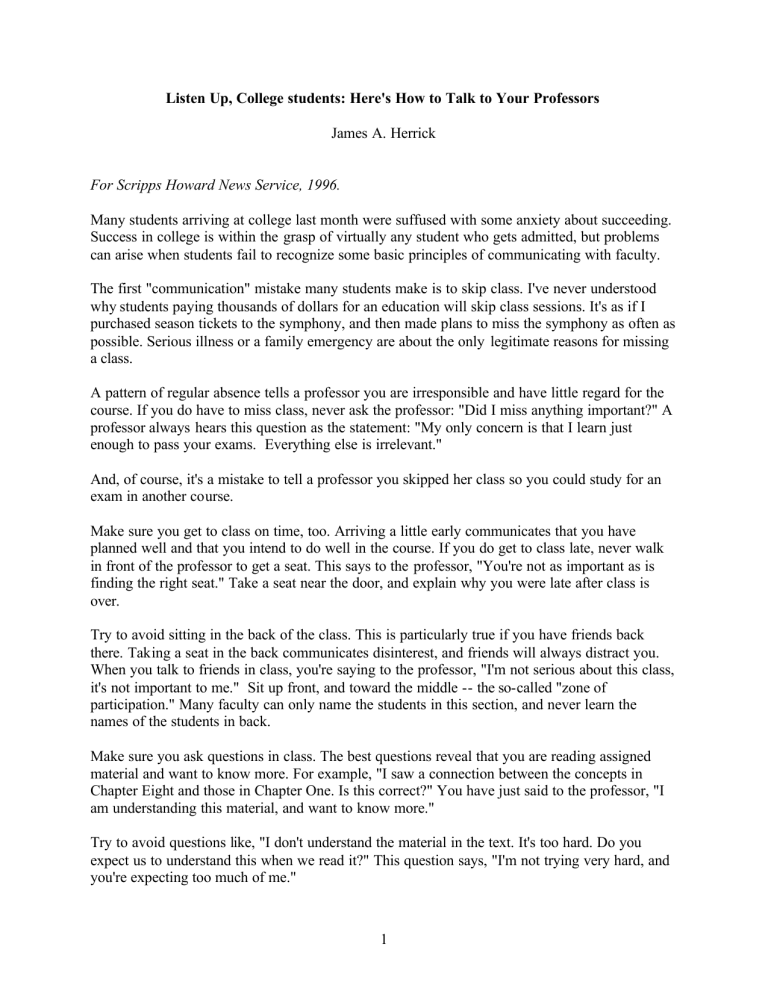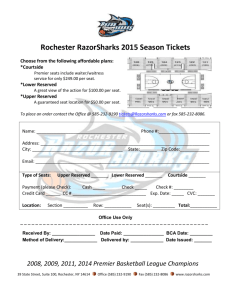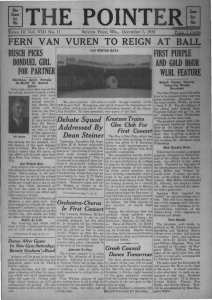James A. Herrick

Listen Up, College students: Here's How to Talk to Your Professors
James A. Herrick
For Scripps Howard News Service, 1996.
Many students arriving at college last month were suffused with some anxiety about succeeding.
Success in college is within the grasp of virtually any student who gets admitted, but problems can arise when students fail to recognize some basic principles of communicating with faculty.
The first "communication" mistake many students make is to skip class. I've never understood why students paying thousands of dollars for an education will skip class sessions. It's as if I purchased season tickets to the symphony, and then made plans to miss the symphony as often as possible. Serious illness or a family emergency are about the only legitimate reasons for missing a class.
A pattern of regular absence tells a professor you are irresponsible and have little regard for the course. If you do have to miss class, never ask the professor: "Did I miss anything important?" A professor always hears this question as the statement: "My only concern is that I learn just enough to pass your exams. Everything else is irrelevant."
And, of course, it's a mistake to tell a professor you skipped her class so you could study for an exam in another course.
Make sure you get to class on time, too. Arriving a little early communicates that you have planned well and that you intend to do well in the course. If you do get to class late, never walk in front of the professor to get a seat. This says to the professor, "You're not as important as is finding the right seat." Take a seat near the door, and explain why you were late after class is over.
Try to avoid sitting in the back of the class. This is particularly true if you have friends back there. Taking a seat in the back communicates disinterest, and friends will always distract you.
When you talk to friends in class, you're saying to the professor, "I'm not serious about this class, it's not important to me." Sit up front, and toward the middle -- the so-called "zone of participation." Many faculty can only name the students in this section, and never learn the names of the students in back.
Make sure you ask questions in class. The best questions reveal that you are reading assigned material and want to know more. For example, "I saw a connection between the concepts in
Chapter Eight and those in Chapter One. Is this correct?" You have just said to the professor, "I am understanding this material, and want to know more."
Try to avoid questions like, "I don't understand the material in the text. It's too hard. Do you expect us to understand this when we read it?" This question says, "I'm not trying very hard, and you're expecting too much of me."
1
Make a goal of visiting each of your faculty in their offices two or three times during the semester. Such visits reveal interest in the class, and a desire to do well.
Try not to suggest that the professor is not making things clear in class. Avoid statements like,
"The material in this course really confuses me, and I don't get it when you go over it in class."
This says, "You're not a good teacher, and I'm not a good student."
When you visit a professor, have a specific question in mind that deals with an exercise or a concept. Ask for clarification, and show interest. For example, you might say, "I still am not sure
I understand the difference between X and Y." The professor hears this as, "Your class is interesting, and I have a real interest in mastering this material."
Don't ask for extensions on paper deadlines or exam dates. You have just asked a professor this question: "Can I have this paper in next week? I have had a lot to do lately?" But, the professor has just heard this question: "I'm not very well organized in my work, and I don't take responsibility for completing assignments."
When you ask, "Can I take the exam Monday instead of Friday? I have big exams in two other classes," the professor hears "Your class isn't as significant as my other classes." This is probably not what you want to be communicating.
Following this communication advice can help you succeed in college, provided that you are doing your part outside of class. It's a waste of time, money and opportunity to risk your success in college by making errors in communication that are so easily avoided.
James A. Herrick is the Guy Vander Jagt Professor and chair of the Department of
Communication at Hope College in Holland, Michigan.
2








